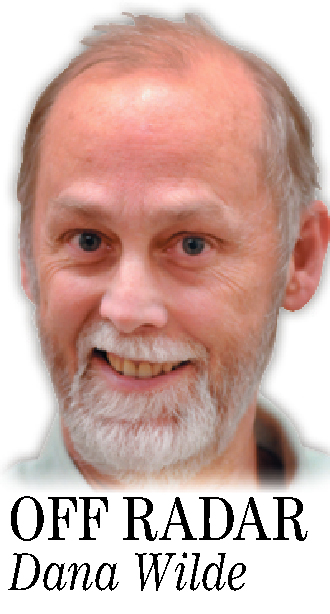“Space Heart: A Memoir in Stages”
As it happens, without planning it, I have been pondering the imminent 50th anniversary of the Apollo 11 moon landing (July 20), reading a book about the space program, listening to Donald Fagen’s 1982 jazz-rock album “The Nightfly” which richly evokes the excitement, idealism and banality of the early 1960s, and reading “Space Heart,” a quietly unsettling, well-crafted memoir by Linda Buckmaster.
“Space Heart” is the former Belfast poet laureate’s personal version of the long, strange trip from the Mercury spacecraft launches to here, where the space shuttles are grounded. Buckmaster grew up in Florida in the 1950s and ’60s, and her father was a flight coordinator for the space program. The family lived in a newly constructed housing development near Cape Canaveral, surrounded by palmettos, heat, beaches, Latin music on the radio, and rockets. Science and technology were going to perfect everything, or so went the enthusiastic thinking of the day. “Maybe someday we’ll go to the sun,” pre-teen Linda thinks while watching one of many rocket launches. She’s got the right dynamic for the new frontier.
Except not everything is quite right with the world. A doctor visit reveals that young Linda has a dangerous heart condition. Technology to the rescue: Surgery using medical science very similar to rocket science, along with some astronaut-like fast thinking by the doctors, repairs the problem. A human heart, like a spacecraft, is a delicate piece of machinery, with a million possibilities to malfunction.
Something else that’s not quite right is her father. Not to put too fine a point on it, but he drinks, and there is nothing, it turns out, that technology can do about this. He’s out late a lot. He gets ugly when he’s drunk. Eventually, he loses his job, and his family.
In the mid-1960s, Linda lights out for the exotic Northeast. “Why should the boys have all the fun, I wondered in high school. Kerouac, Kesey, Ginsberg, Snyder … Young white women in the 1960s with the Pill and driver’s licenses, we could on the road, too. After all, we were Americans, and it was our birthright.” She waitresses on Long Island, drives to Woodstock, moves to Provincetown, with music soundtracks playing in the background familiar to those of us who also rambled, stumbled and stammered through those years. She and her roommates buy a van and criss-cross the country with the Vietnam War and Nixon’s re-election careening around them. Finally she and her friends drive a Volkswagen bug to Waldo County, Maine, where she becomes part of what we now know as the back-to-the-land movement, “a world apart from Space Coast Florida.” There she settles in to work odd jobs, farm, and become a writer.
A very good writer, as it turns out. The 16 meticulous, plain-spoken essays in “Space Heart” outline, in a way, not just Buckmaster’s life, but maybe the story of America, too. Her lens is the space program, which launched on youthful enthusiasm, traveled high, then returned to Earth. In the early 1960s the prevailing naivete in suburban America was that we’d conquer the moon, solve the last pesky problems of politics, economics and society with science, and “by ’76 we’ll be A-OK,” as Fagen puts it. Somehow, it was never that simple.
In ’86, it turned out, the space shuttle Challenger exploded. In a short, forceful essay reflecting on what she saw on TV, Buckmaster says: “I can’t believe I still know this. I still know the rhythm of a successful launch. Growing up with the early days of the space program, I know the way it is supposed to look, how much time should pass until that first stage drops off, the arc of success at the beginning of the flight down range, the firecracker fizzle of something gone wrong.”
We have not been to the moon since 1972.
Somehow, though, like Linda Buckmaster’s space age heart, we are still ticking. In the book’s later essays, she narrates a late-life return to Florida, along with her wayward brother, in an effort to figure out what happened. At one point she daydreams about what life might have been like if her father had been “something other than a minor engineer on a big project who drank his way out of a security clearance.” The story, “too sappy,” goes nowhere. She and her brother head back to the tour group on its way to revisit the launch pad of Apollo 1, where in 1967 a wiring malfunction spawned a fire that killed three astronauts.
How did the moon, which seemed suddenly so close in July 1969, go back to seeming so far away? Buckmaster does not have the answer, exactly, but she has a definitive story about it.
Linda Buckmaster, of Belfast, has taught at UMaine-Augusta and is the author of three poetry collections including “Heart Song and Other Legacies.” Her short fiction and essays have been published widely; “Becoming Memory” earned a Notable Essay distinction in “Best American Essays 2013.”
“Space Heart” is available from local and online book sellers.
Off Radar takes note of poetry and books with Maine connections the first and third Thursdays of each month. Contact Dana Wilde at universe@dwildepress.net.
Send questions/comments to the editors.




Comments are no longer available on this story